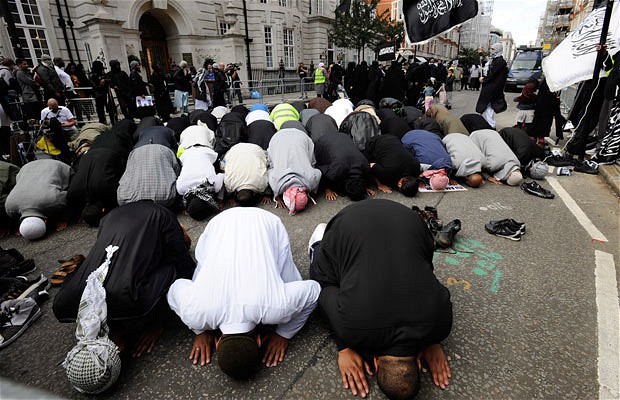
9/11 anniversary outside the US Embassy in London
WASHINGTON DC. Fifteen years ago, the United States Commission on International Religious Freedom opened shop with a mandate from Congress to examine the state of religious freedom around the world, and issue an annual report to the President. The idea was to provide the information necessary for the U.S. government to make religious freedom a greater factor in foreign-policy-making by highlighting the world’s worst offenders. Such offenders run, as the commission’s 2013 religious freedom report tells us, from Saudi Arabia to China to Russia to Sudan to Iran to Western Europe.
Western Europe?
The 2013 report marks the first time that the region of Western Europe has made the commission’s official watch list. It doesn’t debut as a “tier-one” offender, or even “tier two”. Western Europe, however, is listed in the commission’s third category of concern along with Bahrain, Bangladesh, Ethiopia, Turkey and Venezuela as a “monitored” region.
Not that the commission can claim much influence on U.S. foreign policy. After all, of the top recipients of U.S. foreign aid – Afghanistan, Iraq, Israel, Pakistan and Egypt – four out of the five make the commission’s religious freedom watch list, with Iraq, Pakistan and Egypt ranking as top-tier offenders. Afghanistan is deemed a second-tier offender. Israel, meanwhile, is not on the list of offenders at all. It is also the only non-Islamic nation of the five. Coincidence
As far as the U.S. religious freedom commission goes, yes, absolutely. In cataloguing all manner of religious totalitarianism of mainly Islamic and Communist (or post-Communist) varieties, the commission fails utterly to connect the repressive, punitive laws of the Islamic nations to their direct sources in Islam. For example, the commission’s report tells us that Iraqis have “regulations” barring Muslims from “converting to another religion”. Similarly, in Sudan, it is “Article 126 of the 1991 Criminal Act” that defines leaving Islam as a capital offense. Neither of these statements are untrue, but the original source of both laws is in the sharia – Islamic apostasy law.
Such connections elude the commission’s report. It is “the Iranian justice system”, for example, that fails to grant Iranian women the same legal status as men, as when Iranian courts weigh a man’s testimony as “equivalent to testimony by two women”. Again, this statement isn’t untrue, but this example of male supremacism is a direct expression of sharia in the Iranian justice system. When it comes to Pakistan, the report explains that “Article 295, Section B” makes defiling the Koran punishable by life imprisonment”; additionally, it is “under Section C of the same article [that] remarks found to be derogatory against Prophet Mohammed carry the death penalty.” What the report doesn’t make clear is that the source of all such repressive legislation is, again, Islamic apostasy laws, pure and simple. These laws from the sharia represent the life-and-death powers of the Islamic religious state.
This should be of central relevance to any religious freedom commission. However, the direct connections between Islamic law and religious-based repression are lacking throughout the 371-page U.S. report. Even when the commission catalogues manifestations of this religion-based repression, it never links them to mainstream Islam or classical sharia. Rather, it is always an “extreme” or “restrictive” or “local” variant of Islam or sharia that is to blame. This disconnect leads directly to the commission’s decision to “monitor” Western Europe.
Given the commission’s evident concern over increasing enforcement of “blasphemy laws” in its countries of concern, it wouldn’t have been at all out of place for the commission to focus attention on the spate of Islamic “blasphemy” cases that European nations have prosecuted against such critics of Islam as Geert Wilders in the Netherlands, Elisabeth Sabaditsch-Wolff in Austria, and Lars Hedegaard in Denmark. However, the US commission has completely ignored all such Islam-inspired state encroachments on freedom of speech and conscience.
Instead, what comes under critique are those relatively few legislative efforts in Western Europe that restrict vectors of the same totalitarianism the commission has seen fit to flag in Islamic countries. The commission expresses worry about the abuse and inequality of women in the shadows of Islam, but sees public bans on full-face veil in France and Belgium, for example, as limitations on religious liberty. The commission is alarmed by harsh punishments meted out by Islamic states for “blasphemy” or “apostasy” – the ultimate act of political control of the human spirit – but it scores the Swiss for banning the construction of new minarets, the ultimate symbols of political Islam.
Blind to the doctrinal nature of Islamic religious repression, the U.S. commission is also blind to the measures required to preserve religious freedom.









